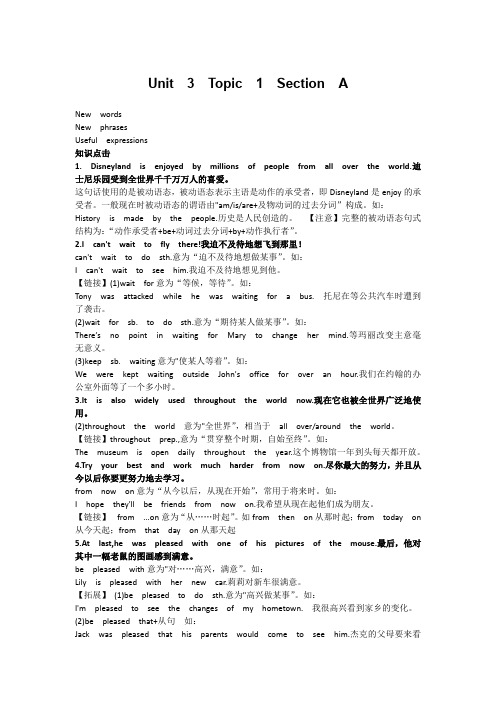仁爱英语九年级上册unit1topic3sectionD
- 格式:ppt
- 大小:1.65 MB
- 文档页数:20


Unit 3 Topic 1 Section ANew wordsNew phrasesUseful expressions知识点击1. Disneyland is enjoyed by millions of people from all over the world.迪士尼乐园受到全世界千千万万人的喜爱。
这句话使用的是被动语态,被动语态表示主语是动作的承受者,即Disneyland是enjoy的承受者。
一般现在时被动语态的谓语由"am/is/are+及物动词的过去分词”构成。
如:History is made by the people.历史是人民创造的。
【注意】完整的被动语态句式结构为:“动作承受者+be+动词过去分词+by+动作执行者”。
2.I can't wait to fly there!我迫不及待地想飞到那里!can't wait to do sth.意为“迫不及待地想做某事”。
如:I can't wait to see him.我迫不及待地想见到他。
【链接】(1)wait for意为“等候,等待”。
如:Tony was attacked while he was waiting for a bus. 托尼在等公共汽车时遭到了袭击。
(2)wait for sb. to do sth.意为“期待某人做某事”。
如:There’s no point in waiting for Mary to change her mind.等玛丽改变主意毫无意义。
(3)keep sb. waiting意为"使某人等着”。
如:We were kept waiting outside John's office for over an hour.我们在约翰的办公室外面等了一个多小时。
3.It is also widely used throughout the world now.现在它也被全世界广泛地使用。

仁爱九年级上册Unit1Topic3重要知识点,作文范文!仁爱版英语九年级上Unit 1 Topic 3知识点梳理Section A重点短语1. 1) Helen is talking with Bob on the phone.(提问)How is Helen talking with Bob?2) I often chat with my good friend on the Internet. (提问)2. How do you like … ?= what do you think of?eg:1) How do you like the movie?= What do you think of the movie?2) How do you like living there? (同义句)= What do you think of living there?3. get used to doing sth= be used to doing sth习惯于做…eg: 1) Lily is used to going to bed early.= Lily gets used to going to bed early.2) My father is / gets to (smoke). It’s bad for his lungs.4. 含有used的句子变成一般疑问句时在句首加Did, 加了Did之后,后面的used去掉d还原成use;含有used的句子变成否定句时,在used的前面加didn’t,加了didn’t之后,后面的used去掉d 还原成use。
eg:1)I used to enjoy listening to pop music. (改为一般疑问句)Did you use to enjoy listening to pop music?2) My sister used to play the piano. (改为否定句)My sister didn’t use to p lay the piano.3) Jane used to be a teacher. (改为一般疑问句)Did Jane use to be a teacher?5. Isn’t it dangerous there? 在那儿难道它不危险吗?这是一个反问句,在英语中,反问句也可称为否定疑问句,常译为难道不…吗?结构为:be / 助动词 /情态动词的否定 + 主语 + 谓语+ …eg:1)Didn’t he go to the park yesterday?2) Can’t Lily pla y the piano?3) Hasn’t Jim been to the Great Wall?4) Won’t they go climbing next Sunday?注意:在回答反问句时,要反着译即Yes译为No, No译为Yes.1) Didn’t he go to the park yesterday?Yes, he did. / No, he didn’t.不,他去了。


精品文档课文原文及翻译仁爱英语九年级上册Unit 3Worldthe English Around Unit 3 遍及世界的英语world.throughout the English is widely spoken T opic 1英语在全世界被广泛使用Section AMiposter of look! I have a Hi, boys, come and have a你们好,来看看吧!Donald Duck. ckey Mouse and我有一张米老鼠和唐老鸭的海报。
噢,真好the wall.stick it on it's so nice! You can Oh,看啊!你可以把它贴在墙上。
gare parents and I My s a good idea. Guess what! That'ablebe Angeles. I will oing to visit Disneyland, near Los那是个好主意。
知道吗!我和我的characters. see more cartoon to父母将去游览洛杉矶附近的迪斯尼乐园。
我会见到更多的卡通人物。
omillions enjoyed by lucky! 're so Disneyland is Oh, youthere go I can over the world. I hope f people from all噢,你太幸运了!世界上数以百万的人都喜欢迪斯尼游乐园,day. one希望有一天我也能去那儿。
我也是。
你们为旅行your for trip? too. Are you ready Me,做好准备了吗?是啊,fly there! 't wait to Yes, of course. I can当然了。
我迫不及待地想飞到那儿呢。
你English there. chance to practice You'll have a good在那儿将有一个练习英语的好机会。

仁爱版九年级英语上册 Unit 1 Topic 3 知识汇总Unit 1 Topic 3单词in fact[ɪn'fækt]事实上,其实= as a matter of factblock[blɒk]n.街道(区);(方形平面)大块artist['ɑːtɪst]n.艺术家,(尤指)画家millions of大量;数以百万计visitor n.游客;来访者;参观者industry[ˈɪndәstri]n.行业;工业chemistry['kemɪstri]n.化学;化学物term[tɜːm]n.学期;词语;措辞program['prәʊgræm]n.计划,方案;节目homeless['hәʊmlɪs]adj.无家的manage[ˈmænɪdʒ]v.完成;能解决;经营treatment[ˈtriːtmәnt]n.疗法;治疗training['treɪnɪŋ]n.训练,培训immediately[ɪˈmiːdɪәtli]adv.立刻,立即secretary[ˈsekrәtri]n.秘书helper n.帮手,助手club[klʌb]n.俱乐部engineer[ˌendʒɪ'nɪә]n.工程师;技师wound[wuːnd]n.创伤,伤口;v.伤,伤害basic['beɪsɪk]adj.基本的,基础的human['hjuːmәn]adj.人的n.人=human beings value[ˈvæljuː]v.重视,珍视n.价值period[ˈpɪәrɪәd]n.一段时间,时期shelter[ˈʃeltә]n.收容所;遮蔽物earn[ɜːn]n.挣钱;挣得,赢得drug[drʌɡ]n.毒品;药,药物mental[ˈment(ә)l]adj.精神健康的;思想的on purpose故意,有意地whatever[wɒtˈevә]pron.无论什么,不管什么effect[ɪˈfekt]n.影响,结果;效果steal[stәʊl]v.偷,窃取support[sәˈpɔːt]v.帮助,援助;支持phrase[freɪz]n.短语,词组according to据∙∙∙∙∙∙所说,按∙∙∙∙∙∙所报道context n.上下文;语境;背景laborer n.体力劳动者,劳工,工人cruel[ˈkruːәl]adj.残酷的,冷酷的project[ˈprɒdʒekt]n.专题研究;项目;方案aid[eɪd][eɪd]primary[ˈpraɪmәri]adj.小学教育的;主要的;contribution[ˌkɒntrɪˈbjuːʃәn]n.贡献;捐款moral[ˈmɒr(ә)l]adj.道德(上)的development[dɪˈvelәpmәnt]n.发展;开发respect[rɪˈspekt]v.尊敬,尊重importance[ɪmˈpɔːt(ә)ns]n.重要性,重要continue[kәnˈtɪnjuː]v.持续,继续做college[ˈkɒlɪdʒ]n.(美国)大学;(英国)学院indeed[ɪnˈdiːd]adv.真正地;实际上method[ˈmeθәd]n.方法,办法teenager[ˈtiːneɪdʒә]n.青少年hardly['hɑːdli]adv.几乎不plenty[pliːzd]pron.大量,众多,充足n.充足,大量sunshine['sʌnʃaɪn]n.阳光,日光sunbathe v.沐日光浴;晒太阳beach[biːtʃ]n.海滩,海滨volleyball[ˈvɒlɪˌbɔːl]n.排球cultural adj.文化的surf[sɜːf]v.(互联网上)冲浪,浏览Unit 1 Topic 3同步翻译Unit 1 The changing world变化中的世界Topic 3 The world has changed for the better世界变得更加美好了Section A1a:(Helen and Bob are talking on the phone)(海伦和鲍勃正在打电话。
Unit1 Topic3 SectionD 教学设计Ⅰ. Material analysis本课是九年级第一单元第三话题的第四课时,是本话题的复习课。
学生通过Grammar和Functions来归纳总结since/for在现在完成时态中的运用并复习本话题的重要功能句。
1a通过介绍“Project Hope”综合复习现在完成时和一些重要的表达法。
1b所提供的问题可以很好地培养学生“带着问题阅读”的习惯。
同时,通过回答问题,让学生把短文复述一遍。
2在语法上是训练学生在具体语境中运用动词,检测学生对不同时态的掌握和运用程度,在内容上则是与1a相呼应,举例说明“Project Hope”的重要作用。
Project部分则是让学生了解更多的公益组织,从而激发学生关注不同的社会组织,倡导学生积极加入公益组织帮助他人。
Ⅱ.Teaching aims1.Knowledge aims:掌握本课的重点词汇和短语,复习现在完成时和重点表达法。
2.Skill aims:培养学生通过wh-questions(如:what,when等),理解和分析说明文。
能够读懂有关组织机构简介的文章。
3.Emotional aims: (optional)关注失学儿童,珍惜现在的美好生活和学习机会。
4.Culture awareness:(optional)了解社会服务机构的宗旨、功能和取得的成绩。
通过对国际性社会公益组织的了解,关注社会的发展与进步。
Ⅲ. The key points and difficult points1. Key points:Words and phrases: project, primary, encourage, development, continue, college, aid, contribution, moral, respect, importanceafford an education, by 2012, primary school, make a contribution to, moral development, respect their teachers, one another2. Difficult points:能学会归纳话题中重点语法和表达法。
Unit 1 The Developing WorldTopic 3 Project Hope has changed my lifeSection D作者:李青锐单位:灵宝市实验中学学校审验人:郭亚琴预习提示The main activities are 1a and 3b.本课重点活动是1a和3b。
Ⅰ: Pre—reading questions1、What do you know about project Hope?2、What can you do for it ?3、When did Project Hope start?4、What does Project Hope aim ?Ⅱ.Teaching aims and demands教学目标1. Master some useful expressions:social, home and abroad ,aim ,at home and abroad ,Project Hope , a solial service program . poor students , bring…into ,poor areas of China , pay for .2. Review direct speech and indirect speech:(1)“What are you reading, Jane?” Maria asked.(2) Maria asked Jane if there were homeless people in Canada.word formation:(1) Compounds: friendship, filmmaker…(2) Derivations: disobey, impossible, homeless…4. Learn about Project Hope.Ⅲ.Teaching aids教具希望工程的宣传画一张/ 录音机/ 小黑板/ 单词卡片(用于复习构词法)Ⅳ.Five-step Teaching Plan五指教学方案Step 1 Review 第一步复习(时间:10分钟)(检查上次作业,进入复习状态。